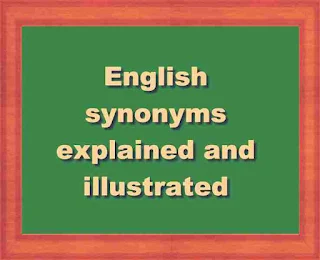English synonyms explained and illustrated (1922)
It has been my aim to point out the nicer distinctions between synonymous words with reference to the established usage of the present day and I have therefore confined myself to authors of the last fifty years. Among the writers that have been read for the purpose of this book are: W. M. Thackeray, George Eliot, Anthony Trollope, John Ruskin, Charles Darwin, T. H. Huxley, Herbert Spencer, John Tyndall, A. Geikie, R. Lydekker, A. W. Bickerton, Robert Ball, J. A. Froude, E. A. Freeman, J. R. Green, Mandell Creighton, S. R. Gardiner, C. Oman, E. S. Beesly, Charles Firth, F. York Powell. J. Mc Carthy, C. Merivale, Frederick Harrison, J. W. Draper, James Bryce, Matthew Arnold, John Morle3% Walter H. Pater, Leslie Stephen, E. Dowden, Sidney Lee, Richard Garnett, Arthur Symons, Mark Pattison, H. D. Traill, Austin Dobson, Lord Avebury, Alfred Tennyson, Stephen Phillips, J. Knight, H. Nettleship, P. L. Waterhouse, J. E. Phythian, J. Munro, T. H. S. Escott, Thomas Seccombe, Arnold-Forster, R. L. Stevenson, George Meredith, Thomas Hardy, R. D. Blackmore, T. Watts-Dunton, J. M. Barrie, W. Besant, G. Moore, Mrs. Ward, F. Marion Crawford, A. Lang, B. Harraden, H. Rider Haggard, H. S. Merriman, John Oliver Hobbes, Stanley J. Weyman, A. Morrison, Rudj^ard Kipling, I. Maclaren, R. Whiteing, Jerome K. Jerome, W. Clark Russell, Lucas Malet, A. Conan Doyle, S. Baring-Gould, Margaret L. Woods, M. Cholmondeley, R. Buchanan, F. Anstey, Bret Harte, Mark Twain, Henry James, W. D. Howells, T. B. Aldrich, Harold Frederic, Edward Whymper, Wilbur L. Cross, Henry A. Beers, Frank Norris, A. Bennett, G. Gissing, J. Galsworthy, H. G. Wells, G. K. Chesterton, G. B. Shaw, Compton Mackenzie, and H. Walpole.
It is a fact known to every schoolboy that English has borrowed an immense number of words from other languages, especially from French and Latin.
Thousands of words were introduced from Norman and Parisian French, and though in most cases the borrowed words had no equivalent in the native speech, it must by no means be supposed that they always supplied a want. So it came about that there were often two words for the same idea, one Romance, the other Germanic. In course of time this bilingualism of the vocabulary came to add greatly to the resources of the language. Words that had originally the same sense became differentiated in meaning and came to express delicate shades of thought. Such is the history of board and table
Author: J. H. A Günther
Download PDF ebook 31 MB.
- Publication date: (1922)
Download PDF ebook 31 MB.

